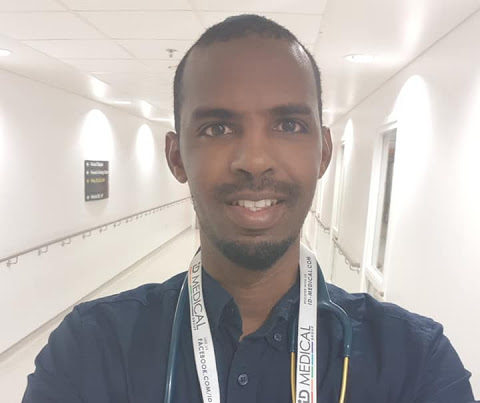

I am now a Doctor in the national health service NHS. I am serving the community that I live in and work is just a short walking distance from home. However, the journey to get to this point has been very long and rather challenging.
I graduated from Amoud University in 2014. I completed my one-year internship straight afterward. My intern year provided me with a broad exposure to a variety of surgical and non-surgical specialties, with a focus on the care and management of patients.
I undertook teaching roles at Amoud and Eelo Universities. I was also Medicine Africa Co-Ordinator for the King’s Somaliland Partnership.I came to the UK in November 2016 to join my wife.
Shortly after arriving; I enrolled in an International English Language Testing System (IELTS) course to prepare for my academic IELTS. This course was structured and enabled me to successfully pass this exam.
To register as a Doctor I am required to demonstrate that I possess the necessary knowledge of English to practice safely in the UK. Therefore, a score of at least 7.0 in each testing area; reading, writing, speaking as well as listening and an overall score of 7.5 are required. The Professional and Linguistic Assessments Board (PLAB) test provides the main route for International Medical Graduates to establish that they have the necessary skills and knowledge to practice medicine in the United Kingdom.
I independently prepared for PLAB 1. This is a written exam made up of 180 multiple choice questions which must be answered within three hours. The exam tested my ability to apply my knowledge for the care of patients and questions related to current best practice in the UK, and equipment routinely available in UK hospitals.
PLAB 2 is an objective structured clinical exam (OSCE). It’s made up of 18 scenarios, each lasting eight minutes and aims to reflect real life settings including a mock consultation or an acute ward. I went to Manchester to sit this exam. Prior to this, I undertook a two months preparation course to enable to successfully grasp standard criteria and competencies.
I completed a one day Immediate Life support course at King’s College NHS Foundation Trust in November 2018. This course has enabled me to refresh my skills as a first responder and treat patients in cardiac arrest until the arrival of a cardiac arrest team.
Currently, I work Royal London hospital in London, renal medicine and transplant centre which is the 3rd largest transplant centre in the whole UK.
What I was taught in Amoud university enabled me to work in the UK in the same way as the UK trained doctors. Which means if you are trained in Amoud university, you are allowed to work and practice in the UK provided you pass the licensing exams.
I am so grateful for my wife and family for their support and particularly for prof Said Ahmed Walhad and Dr. Ismail Aye for their relentless assistance.
Moreover, I am also indebted for Ahmed I. Nour and Nuradin Adam.
In nutshell, no matter where you learn, hardworking is the key to success.
The ideas, conclusions, and recommendations of an opinion article in Somaliland.com are solely those of its author(s) and do not reflect the views of the Institution, its management, or its other staff.
more recommended stories
 President Irro’s Landmark Visit to UAE: A Diplomatic and Economic Win for Somaliland. Dubai, UAE – Somaliland’s Diplomatic Breakthrough
President Irro’s Landmark Visit to UAE: A Diplomatic and Economic Win for Somaliland. Dubai, UAE – Somaliland’s Diplomatic BreakthroughBy: Abdi Jama President Dr. Abdirahman.
 Kenya’s Unjustifiable Interference in Sudan: A Grave Violation of International Law and Regional Stability
Kenya’s Unjustifiable Interference in Sudan: A Grave Violation of International Law and Regional StabilityBy: Abdi Jama Kenya’s continued meddling.
 𝗙𝗼𝗿𝗺𝗲𝗿 𝗣𝗿𝗲𝘀𝗶𝗱𝗲𝗻𝘁 𝗠𝘂𝘀𝗲 𝗕𝗶𝗵𝗶’𝘀 𝗥𝗲𝗰𝗸𝗹𝗲𝘀𝘀 𝗔𝗰𝘁𝗶𝗼𝗻𝘀 𝗠𝘂𝘀𝘁 𝗡𝗼𝘁 𝗕𝗲 𝗜𝗴𝗻𝗼𝗿𝗲𝗱 – Abdihalim Musa
𝗙𝗼𝗿𝗺𝗲𝗿 𝗣𝗿𝗲𝘀𝗶𝗱𝗲𝗻𝘁 𝗠𝘂𝘀𝗲 𝗕𝗶𝗵𝗶’𝘀 𝗥𝗲𝗰𝗸𝗹𝗲𝘀𝘀 𝗔𝗰𝘁𝗶𝗼𝗻𝘀 𝗠𝘂𝘀𝘁 𝗡𝗼𝘁 𝗕𝗲 𝗜𝗴𝗻𝗼𝗿𝗲𝗱 – Abdihalim MusaYesterday, Somaliland witnessed a deeply troubling.
 ADFD pledges to support Somaliland, after President Irro visit
ADFD pledges to support Somaliland, after President Irro visitThe President of Somaliland, His Excellency.

